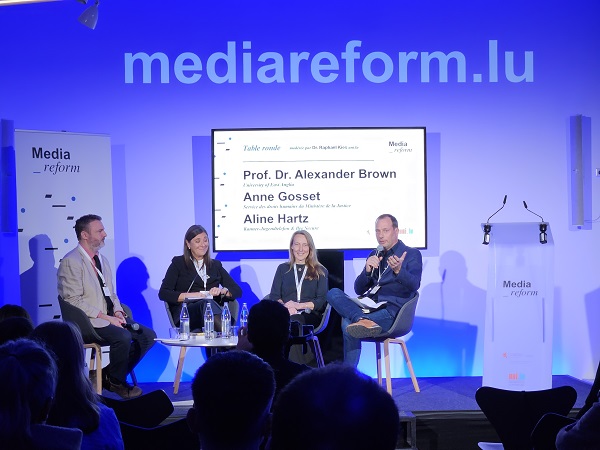 (L-R) Prof. Dr Alexander Brown; Anne Gosset; Aline Hartz; Dr Raphaël Kies (moderator);
Credit: Jazmin Campbell/Chronicle.lu
(L-R) Prof. Dr Alexander Brown; Anne Gosset; Aline Hartz; Dr Raphaël Kies (moderator);
Credit: Jazmin Campbell/Chronicle.lu
On Wednesday 6 November 2024, the latest in a series of conferences about the planned reform of the Electronic Media Law in the Grand Duchy took place at Casino Luxembourg.
This conference series kicked off in May 2024 and is organised by the Department of Media, Connectivity and Digital Policy (SMC) of Luxembourg’s Ministry of State together with the University of Luxembourg. The November conference focused on “Anonymity, incitement to violence and hatred on the Internet: How far does freedom of expression go?”
Dr Stéphanie Lukasik, researcher and co-coordinator of the Medialux research project, introduced the event and guest speaker. She noted that it was important to remember that what is illegal in real life is also illegal online (e.g. hate speech).
Guest speaker Prof. Dr Alexander Brown, an associate professor in Political Legal Theory at the University of East Anglia (UK), then delivered his keynote speech, with a focus on hate speech and studies in which he has been involved on this subject. He noted that in the digital age, we have more information than ever and yet also less consensus, tolerance and civility. On the latter, he mentioned (online) hate speech and the role played by anonymity. He also mentioned the "growing body" of domestic and international law around hate speech, as well as the role played by both non-profit organisations working in this area (albeit with limited resources, at least in the UK) and online platforms.
On recommendations for reporting mechanisms, he noted that timely decisions are important, as is keeping victims updated and protecting their anonymity. However, there are two sides to the coin: what about the anonymity of the author of online hate speech? Studies have shown that anonymity helps people freely express what they really think (the good and the bad); in some cases, people disassociate themselves from their online "persona". This disinhibition (among other factors) does seem to lead to an increase in toxic hate speech content. Platforms can combat this by verifying accounts, for example, but how much of their identity should users reveal to platforms and other users, and how much of this should platforms pass onto law enforcement (regarding illegal content)? How much should platforms encourage users to be verified? What if verified users do not wish to engage with or see content from unverified users (e.g. filtering tool to hide content)? This also raises questions of free speech.
On education, the speaker asked who should be responsible for this: parents, teachers, platforms or even public figures? And what about public figures who use their platform to misinform their audience? Platforms should also play their part, but what if the owner is ideologically aligned with the hate speech author? He mentioned that new media regulation laws should nevertheless require platforms to act socially responsible.
The keynote was followed by a roundtable, moderated by Dr Raphaël Kies (University of Luxembourg) and featuring Prof. Dr Alexander Brown, Anne Gosset (human rights department of the Ministry of Justice) and Aline Hartz (KJT - Kanner-Jugendtelefon and Bee Secure). The panellists offered three complimentary perspectives in this interactive discussion, during which audience members could answer the questions themselves via Sligo. These questions included: Should online freedom of expression be limited (there are legal restrictions)? Does anonymity encourage encitement to violence/hate (agreement that there are two sides to this: protect victims and enrich democratic debate but some people cross the line)? Is freedom of expression threatened by moderation and anonymity? On this, Prof. Dr Alexander Brown stressed that restricting words does mean restricting freedom of expression, and this requires "strong justification". Who should (help) regulate anonymity and hateful/violent speech (role of independent bodies, users and platforms themselves- but they have their own business model and interests)? To what extent should anononymity be preserved (e.g. for adult websites or illegal hate speech)? The answers to this question mentioned the need for stricter regulation, for example for pornographic websites, but also the importance of preserving the anonymity of victims of hate speech, notably those reaching out via helplines and online support chats. Another question was: How can we best educate users? Who should be educated and who should be responisble for educating? The panellists mentioned starting young, at home and in school, for example.
The event concluded with a networking reception.








